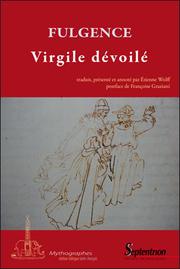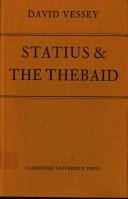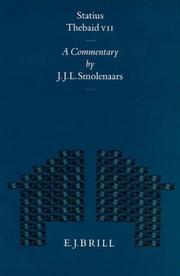| Listing 1 - 7 of 7 |
Sort by
|
Book
ISBN: 9789004207110 9004207112 900424512X Year: 2013 Volume: 354 Publisher: Leiden : Brill,
Abstract | Keywords | Export | Availability | Bookmark
 Loading...
Loading...Choose an application
- Reference Manager
- EndNote
- RefWorks (Direct export to RefWorks)
Winner of the 2015 Jozef IJsewijn Prize for best first book on a Neo-Latin topic Early modern commentaries on Statius’ Thebaid have been little studied; even that by Barth (1664-5), which holds a conspicuous place among them, has only been taken into account now and then, and often in a rather superficial way. The present book, which makes use of unpublished archival material, offers a comprehensive overview of these works (contexts, contents, interconnections). It is particularly interested in 16th-17th commentators and strives to give Barth’s achievement the attention it deserves. By closely looking at the various ways in which the commentaries respond to Statius’ poem, but also at the various kinds of discourse they present, it casts a new light on the reception of the Thebaid and on the early modern practice of commentary-writing. Les anciens commentaires imprimés de la Thébaïde de Stace ont été peu étudiés ; même celui de Barth (1664-5), qui occupe parmi eux une place éminente, n’a été pris en compte que de manière ponctuelle et souvent superficielle. Le présent ouvrage, étayé par des documents d’archives inédits, offre un examen général de ces travaux (contextes, contenus, filiations). Il s’intéresse particulièrement aux commentateurs des 16e-17e s. et s’efforce d’accorder à Barth l’attention qu’il mérite. En se penchant sur les différentes façons dont les exégèses répondent au poème de Stace, mais aussi sur les différents types de discours qu’elles présentent, il apporte un éclairage nouveau sur la réception de la Thébaïde et sur la pratique du commentaire au début de l’époque moderne.

ISBN: 9782757400913 2757400916 Year: 2009 Volume: 1148 Publisher: Villeneuve-d'Ascq : Presses universitaires du Septentrion,
Abstract | Keywords | Export | Availability | Bookmark
 Loading...
Loading...Choose an application
- Reference Manager
- EndNote
- RefWorks (Direct export to RefWorks)
Fulgence le Mythographe, auteur latin du 5e ou 6e siècle, était célèbre durant tout le Moyen-âge pour ses interprétations allégoriques des mythes antiques. Son commentaire de l'Énéide, traduit ici pour la première fois en français, a marqué durablement l'histoire de la culture européenne, et Dante en a tiré la figure romanesque de son Virgile, surgi du passé pour le guider à travers les ténèbres infernales. Virgile en personne vient ici expliquer la « substance » des figures et des noms poétiques, dans un dialogue avec son lecteur qui bouscule les habitudes. La lecture du poème ainsi dévoilé s'en trouve singulièrement renouvelée, car les allégories de Fulgence, soutenues par une pratique inventive de l'étymologie, sont faites pour surprendre.Pour donner au lecteur d'aujourd’hui les moyens d’entendre la méthode allégorique qui donnait sens à la parole « voilée » des anciens poètes, nous avons choisi de faire suivre l’Interprétation de Virgile de quelques textes médiévaux complémentaires, également inédits en français, et d’une postface synthétique situant ces textes dans la continuité des traditions philosophiques et littéraires qui depuis l’Antiquité n’ont cessé de défendre la profondeur et la liberté de l’imagination poétique.
Book
ISBN: 9789004537132 9004537139 9004537155 Year: 2023 Publisher: Leiden, The Netherlands : Koninklijke Brill nv,
Abstract | Keywords | Export | Availability | Bookmark
 Loading...
Loading...Choose an application
- Reference Manager
- EndNote
- RefWorks (Direct export to RefWorks)
"This book offers an intertextual study of dawn and dusk descriptions in Statius' Thebaid. Poetic images such as rosy-fingered Dawn and the fiery chariot of the Sun sinking into the Ocean are the result of learned work on the previous literary tradition. The striking dawn and dusk descriptions in the Thebaid offer a perfect illustration of the way in which the traditional characteristics of the motif can be remodelled to produce new meaning. Each chapter in this monograph examines one of the aspects associated with dawns and dusks: formulaic diction, structuring role, relation to time and light, allegory"--
Dawn in literature. --- Twilight in literature. --- Intertextuality --- Epic poetry, Latin --- Aube dans la littérature. --- Dawn in literature --- Twilight in literature --- History and criticism. --- Statius, P. Papinius --- Thebais (Statius, P. Papinius) --- Statius, P. Papinius - (Publius Papinius). - Thebais.
Book
ISBN: 9042906936 2877234053 9789042906938 Year: 1998 Volume: 14 Publisher: Louvain Peeters
Abstract | Keywords | Export | Availability | Bookmark
 Loading...
Loading...Choose an application
- Reference Manager
- EndNote
- RefWorks (Direct export to RefWorks)
Histoire et culture romaines --- Latijnse letterkunde --- Littérature latine --- Romeinse geschiedenis en cultuur --- Epic poetry, Latin --- Heroes in literature --- History and criticism --- Statius, P Papinius --- Valerius Flaccus, Gaius, --- Rome --- History --- Argonauts (Greek mythology) in literature. --- Ethics, Ancient, in literature. --- Heroes in literature. --- History and criticism. --- Statius, P. Papinius --- Silius Italicus, Tiberius Catius. --- Argonauts (Greek mythology) in literature --- Ethics, Ancient, in literature --- Epic poetry, Latin - History and criticism --- Statius, P Papinius - (Publius Papinius) - Thebais --- Valerius Flaccus, Gaius, - active 1st century - Argonautica --- Rome - History - Flavians, 69-96
Book
ISBN: 3820454039 9783820454031 Year: 1984 Volume: 8 Publisher: Frankfurt am Main Lang
Abstract | Keywords | Export | Availability | Bookmark
 Loading...
Loading...Choose an application
- Reference Manager
- EndNote
- RefWorks (Direct export to RefWorks)
Epic poetry, Latin --- History and criticism --- Jupiter --- Valerius Flaccus, Gaius, --- Silius Italicus, Tiberius Catius --- Statius, P Papinius --- Rome --- History --- -Jupiter (Roman deity) in literature --- Latin epic poetry --- Latin poetry --- Statius, P. Papinius --- Valerius Flaccus, Gaius --- Silio, --- Silius, --- Silius Italicus, C. --- Silius Italicus, Catius --- Silius Italicus, Tiberius Catius, --- Sillius, --- -Epic poetry, Latin --- Jupiter (Roman deity) in literature. --- History and criticism. --- Silius Italicus, Tiberius Catius. --- Publius Papinius Statius --- Statius, Papinius --- Stace --- Jupiter (Roman deity) in literature --- Jupiter - (Roman deity) --- Valerius Flaccus, Gaius, - active 1st century - Argonautica --- Silius Italicus, Tiberius Catius - Punica --- Statius, P Papinius - (Publius Papinius) - Thebais

ISBN: 0521200520 9780521200523 Year: 1973 Publisher: Cambridge : University press,
Abstract | Keywords | Export | Availability | Bookmark
 Loading...
Loading...Choose an application
- Reference Manager
- EndNote
- RefWorks (Direct export to RefWorks)
Seven against Thebes (Greek mythology) in literature --- Thebes (Greece) in literature --- Sept contre Thèbes (Mythologie grecque) dans la littérature --- Statius, P. Papinius --- Epic poetry, Latin --- -Seven against Thebes (Greek mythology) in literature --- Latin epic poetry --- Latin poetry --- History and criticism --- Eteocles (Greek mythology) --- Polyneices (Greek mythology) --- Seven against Thebes (Greek mythology) in literature. --- Sibling rivalry in literature. --- History and criticism. --- Publius Papinius Statius --- Statius, Papinius --- Stace --- Eteocles (Greek mythology). --- Polyneices (Greek mythology). --- Sept contre Thèbes (Mythologie grecque) dans la littérature --- Sibling rivalry in literature --- Thebes (Greece) --- Thēvai (Greece) --- Thívai (Greece) --- Thebes (Greece : Ancient city) --- Thiva (Greece) --- Thēva (Greece) --- Tebe (Greece) --- Theben (Greece) --- Thebes (Greece : Extinct city) --- Θῆβαι (Greece) --- Thēbai (Greece) --- Θήβα (Greece) --- In literature. --- Polynices --- Eteocles, --- In literature --- Epic poetry, Latin - History and criticism --- Statius, P. Papinius - (Publius Papinius) - Thebais --- Polynices - (Greek mythological figure) --- Eteocles, - King of Thebes (Mythological character) --- Thebes (Greece) - In literature

ISBN: 9004100296 9004329390 9789004100299 Year: 1994 Volume: 134 Publisher: Leiden Brill
Abstract | Keywords | Export | Availability | Bookmark
 Loading...
Loading...Choose an application
- Reference Manager
- EndNote
- RefWorks (Direct export to RefWorks)
The epic poem the Thebaid by P. Papinius Statius, written about AD 80 to 92, deals with the fraternal strife between Oedipus' sons Eteocles and Polynices for the mastery of Thebes. Book VII describes the forced march of the Seven and their arrival at Thebes, Jocasta's vain attempt at mediation and Amphiaraus' spectacular katabasis . This book is the first which deals with Thebaid VII since Barth (1664) and Amar andamp; Lemaire (1825-30). Apart from being a commentary in the philological sense, it examines in close detail the poet's mannered style and analyses the text as a system of intertextual references. In addition to Homer and Vergil, specific passages from Euripides, Lucan, Seneca and especially Valerius Flaccus were exploited by Statius to create his challenging imitation. The identification of these sources offers the key to interpret and evaluate the poet's artistic intentions. The Introduction discusses Statius' technique of multiple imitation. The information brought together has been made easily accessible by full indexes and an appendix listing the passages imitated by Statius.
Statius, Publius Papinius --- Ancient rhetoric --- Antieke retoriek --- Retoriek [Antieke ] --- Retoriek van de Oudheid --- Rhetoric [Ancient ] --- Rhétorique ancienne --- Rhétorique de l'Antiquité --- Sept [Les ] contre Thèbes (Mythologie grecque) dans la littérature --- Seven against Thebes (Greek mythology) in literature --- Zeven [De ] tegen Thebe (Griekse mythologie) in de literatuur --- Epic poetry, Latin --- Rhetoric, Ancient --- Sept contre Thèbes (Mythologie grecque) dans la littérature --- Poésie épique latine --- History and criticism --- Histoire et critique --- Statius, P. Papinius --- Virgil --- Virgil. --- Influence. --- Seven against Thebes (Greek mythology) in literature. --- Sibling rivalry in literature. --- Polyneices (Greek mythology) --- Eteocles (Greek mythology) --- Rhetoric, Ancient. --- History and criticism. --- -Rhetoric, Ancient --- 870 --- 870.9001 --- Classical languages --- Greek language --- Greek rhetoric --- Latin language --- Latin rhetoric --- Latin epic poetry --- Latin poetry --- Literature Latin --- Literature Latin ( - 500) --- Rhetoric --- -Virgil --- Virgilio Marone, P. --- Vergilius Maro, Publius --- Vergilīĭ --- Virgile --- Vergílio --- Wergiliusz --- Vergilīĭ Maron, P. --- Vergilīĭ Maron, Publīĭ --- Verhiliĭ Maron, P. --- Vergil --- Virgilio --- Virgilīĭ --- Virgilius Maro, P. --- Virgilius Maro, Publius --- Virgil Maro, P. --- ווירגיל --- וירגיליוס --- ורגיליוס --- מרו, פובליוס ורגיליוס --- فرجيل --- Pseudo-Virgil --- Pseudo Virgilio --- Virgilio Marón, Publio --- Bhārjila --- Influence --- Thebes (Greece) --- In literature. --- Publius Papinius Statius --- Statius, Papinius --- Stace --- Virgilio Marone, P., --- Vergilīĭ, --- Virgile, --- Vergílio, --- Wergiliusz, --- Vergilīĭ Maron, Publīĭ, --- Verhiliĭ Maron, P., --- Vergil, --- Virgilio, --- Virgilīĭ, --- Virgilius Maro, P., --- Virgilius Maro, Publius, --- Virgil Maro, P., --- ווירגיל, --- וירגיליוס, --- ורגיליוס, --- מרו, פובליוס ורגיליוס, --- فرجيل, --- Pseudo-Virgil, --- Pseudo Virgilio, --- Virgilio Marón, Publio, --- Bhārjila, --- Eteocles (Greek mythology). --- Polyneices (Greek mythology). --- Virgilio Máron, Publio --- Vergili Maronis, Publius --- Sept contre Thèbes (Mythologie grecque) dans la littérature --- Poésie épique latine --- Rhétorique ancienne --- Sibling rivalry in literature --- Thēvai (Greece) --- Thívai (Greece) --- Thebes (Greece : Ancient city) --- Thiva (Greece) --- Thēva (Greece) --- Tebe (Greece) --- Theben (Greece) --- Thebes (Greece : Extinct city) --- Θῆβαι (Greece) --- Thēbai (Greece) --- Θήβα (Greece) --- Epic poetry [Latin ] --- Statius, P. Papinius - (Publius Papinius). - Thebais. - Liber 7. --- Vergilius Maro, P. --- Vergilius --- Marone, Publio Virgilio --- Epic poetry, Latin - History and criticism.
| Listing 1 - 7 of 7 |
Sort by
|

 Search
Search Feedback
Feedback About UniCat
About UniCat  Help
Help News
News